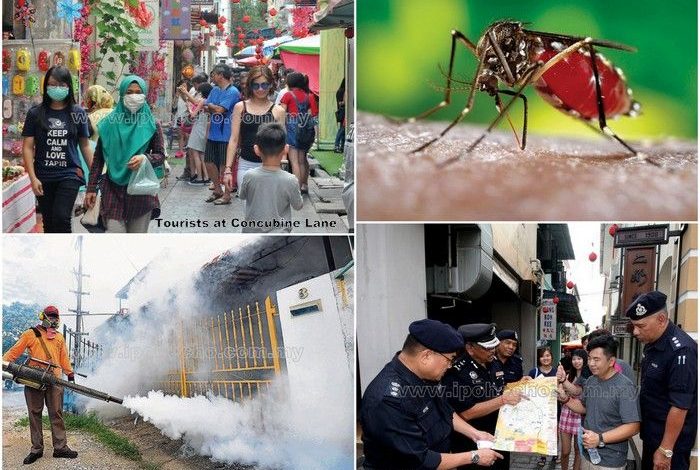

By Nabilah Hamudin, Rosli Mansor and Leanne Tan
As one of the most popular holiday destinations in Malaysia, Ipoh lures around 300,000 to 400,000 foreign travellers on average every year, thanks to Ipoh’s heritage township and relaxed pace of life. But a series of recent safety and health issues including the popular tourist area, is likely to cast a shadow over its safety credentials.
The recent snatch-theft case where a Swiss tourist was injured after he was attacked at Jalan Raja Ikram on February 16 combined with an influenza-like illness (ILI) outbreak which affected 512 students of several schools in Ipoh, plus the rise in dengue cases for the first two months, may raise concerns to locals and tourists to the city. Add to this, the issue of parking touts disturbing visitors near the popular night cum flea market ‘Gerbang Malam’ have brought a negative image to the outsiders who come to Ipoh for the first time.
Safety and health issues can be prevented if every agency proactively play their roles
With all these things being highlighted, the first question that will come to one’s mind is: what actions are being taken by the relevant authorities?
Checks by Ipoh Echo to several tourist hotspots around the old town and new town area, as well as residential areas have garnered various reactions from the members of the public, local and foreign visitors.
An engineer, Ahmad Razli Muhammad Ismail, 50, said he still takes precautionary measures despite no new ILI cases being reported. “I was shocked that Ipoh was struck by an ILI outbreak. Since then, I always bring face masks wherever I go and wear it. I always remind my children to always wear face masks if they have outdoor activities,” he told Ipoh Echo.
A tourist from the United States, James Alcott Liam, said he and his family feel safe while traveling around Ipoh and never experienced any criminal activity. “I feel safe walking around the heritage buildings with my wife and daughter. We also noticed the police presence at every corner of the streets,” said Alcott who came to Ipoh for the first time.
It was different for Shahrul Razi Muhammad Azli, 25, who was requested to give money by a stranger at the Ipoh Railway Station parking lot. “I was sending my friend to the railway station and a stranger approached us and demanded money. At that time, we just went out of the car. We just gave him as we were scared that he would do something to the car,” he said.
However, all the safety and health issues can be prevented if every agency proactively play their roles.
Menteri Besar


It was said by Perak Menteri Besar Dato’ Seri DiRaja Dr Zambry Abdul Kadir when he stressed that the state government and other relevant authorities have made much effort and taken measures to ensure the safety of locals and tourists, especially in Ipoh.
“I have received several complaints regarding the extortion and snatch theft cases involving tourists and I take these issues very seriously. We don’t want Ipoh tainted by these immoral acts, thus, we have sought assistance from the police,” he said.
He added that several policemen have been stationed at every corner of the popular tourist spots in Ipoh, especially in the old town area to monitor public safety with a concept of ‘omnipresence’.
So please don’t be scared to come to Ipoh!


Police
Perak Crime Prevention and Community Safety Department Chief Senior Assistant Commissioner T. Selven said Ipoh is definitely a safe place to visit and stay as it has recorded a decrease of crime index since 2015.
“In 2015, a total of 2426 cases were recorded as compared to 2206 cases last year. It showed a drop of 220 cases,” he told Ipoh Echo.
Despite the decrease, police still beefed up the security in Ipoh through many community policing programmes including conducting an operation codenamed ‘Ops Payung’ by setting up observation posts at popular tourist areas in town – Ipoh’s old town and new town area in conjunction with Visit Perak Year 2017.
Based on police analysis, he said most of the crimes in Ipoh happened between 3am to 6am and 6pm to 9pm and the popular days are on Friday, Saturday, Sunday, Monday and Tuesday. He advised the public to always be careful when they go out during this time.


“Perak and Ipoh is a safe place. No matter how safe the place is, it still needs self-consciousness from the public to always care for their safety. We’re not always everywhere. We need the public to be with us to fight crime,” he said.
He also revealed three most popular crimes in Ipoh from January to February this year are motorcycle theft, robbery and house break-ins.
“For parking touts, we advise the public not to comply with their request for money. Don’t pay them and don’t be afraid as they are illegal. Come and report to us if you experience this situation. Investigations can be done if there’s a report. We cannot do anything if there’s no report lodged,” he said.
Tourism


“We believe that the outbreak would not bring negative impact to the number of tourists in conjunction with Visit Perak Year 2017. The graph of the number of tourists visiting Ipoh is rising but the figures can only be released in April.
“So far, we notice that the famous tourist spots in Ipoh are still flooded with local and foreign tourists since ILI only affected schools and not the tourist spots. There are no reports of tourists affected by the ILI. So my message to all tourists is: don’t be scared to come to Ipoh as Ipoh is definitely a safe place,” she said, adding that Perak can achieve its target of 6.5 million tourists for Perak this year.


In order to vamp up safety in Ipoh, she said the Tourism Perak launched a joint operation with Ministry of Tourism and Culture (MOTAC) to ensure the public and tourists’ safety on March 18.
During the operation, Perak Motac director Mohd Hizaz Mohd Ibrahim said a total of six buses were issued summonses after they were found operating without a valid permit with unlicensed tour guides. “They were also found providing tour services to tourists with no valid travel documents. If convicted, they can be fined RM2000,” he said.
The operation was joined by other agencies such as the Land Public Transport Commission (SPAD), Road Transport Department, Police, Immigration, National Registration Department, National Anti-Drugs Agency (AADK) and Department of Environment.
Health Department
State Health Department acting director Dato’ Dr Rahimi Goon has also guaranteed that Ipoh is safe despite the ILI outbreak and the rising dengue cases.
“Tourists and locals should not be worried as there were no new ILI cases reported in the state since it was last reported on March 16. However, we’re still monitoring the condition of these students and others as well,” he told Ipoh Echo.
For dengue cases, Rahimi disclosed that the department has identified 15 dengue hotspots in Ipoh and Kinta district. In Ipoh, the hotspot areas are: Taman Shatin, Taman Sri Tanjung, Taman Intan, Kampung Baru Buntong, Kampung Bercham, Kampung Baru Kuala Kuang, Taman Maju Rapat, Taman Ipoh Jaya, Taman Cempaka, Taman Lapangan Terbang, Taman Pertama and Pekan Razaki. While in Kinta, they are: Taman Chepor Jaya and Kampung Tersusun Sentang. So, if you are staying in these areas, please be aware and keep your surroundings clean!


Dengue control activities in Ipoh are initiated by Kinta District Health Office and Ipoh City Council (MBI). “The activities carried out include premise and environmental inspection for aedes mosquito breeding, fogging with insecticides, health education activities with the community, gotong-royong, enforcement activities where notices and fines are imposed on owners of premises found to be breeding aedes mosquitoes.
“Our main activity for dengue prevention and control is to make sure the environment is free from Aedes Mosquito breeding. Fogging is done once there is an outbreak or dengue cases being reported as it’s not advisable to carry out fogging indiscriminately. Fogging only kills the adult mosquito and does not get rid of mosquito larvae or eggs,” Rahimy added.
He revealed that from January 1 to March 18, a total of 124,803 premises were inspected with 2758 premises found positive for aedes breeding and 750 fines worth RM375,000 were issued under the Destruction of Disease Bearing Insects Act 1975 (DDBIA).


“In 2016, a total of 522,964 premises were inspected by the Perak Health Department in the whole state, out of which 7285 premises were found to have aedes breeding and 1915 fines worth RM957,500 were issued under the same Act,” he said.
Apart from issuing fines, the Health Department also issues stop work orders and cleaning instructions to certain premises such as construction sites and factories. Court proceedings are also initiated in certain circumstances.
Rahimy said Perak Health Department will conduct inspections and carry out control activities once there is a dengue case or outbreak notification.
“In case of a sporadic case being reported, weekly cycles of control activities are done twice, whereas in outbreaks, weekly control cycle is carried out until the outbreak is declared over. We also carry out scheduled preventive activities in public areas, high risk localities and previous outbreak areas. However, these preventive activities are subject to case burden and availability of resources on any given day,” he said.


